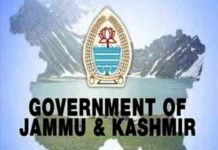Neyaz Elahi
SRINAGAR
Mufti Mohammad Sayeed will be sworn as the 12th Chief Minister of Jammu and Kashmir on March 1, 2015. Born on January 12, 1936, in South Kashmir’s Baba Mohalla Bijbehara area of Anantnag town, the 79 year old Sayeed’s political journey began in 1950 with the National Conference party. He soon fell out with it, joined the Congress Party and played a key role in establishing the party in Kashmir as a key force opposing the National Conference, which dominated the political landscape. It was said that the only thing he had in common with the National Conference leader, Farooq Abdullah, was both men played golf.
Sayeed became a state minister in the Congress Party government in 1971. But the success was followed by a string of defeats – he lost the next two elections. But he bounced back and in 1989 became India’s first Muslim Home Minister.
Having graduated from S.P. College in Srinagar, he went on to obtain a degree in law, and a post-graduate degree in Arab History from Aligarh Muslim University. He started a law practice in Anantnag / Islamabad. In the late 1950s, he joined the Democratic National Conference (DNC) led by G.M. Sadiq. He was appointed district convener of the new organisation, the first formal post he held.
Believed to be the demolisher of National Conference in Jammu and Kashmir, Mufti Muhammad Sayeed had been a member of the Indian National Congress party until 1987. Mufti Mohammad Sayeed was elected to the Assembly from Bijbehara in 1962, and retained the seat in 1967. As a result, he was appointed a Deputy Minister by G.M. Sadiq. In 1972, he became a Cabinet Minster and also Congress party’s leader in the Legislative Council. In 1975 he was made the leader of the Congress Legislature Party and president of Pradesh Congress. In 1987, he quit the Congress party to join V. P. Singh’s Jan Morcha, which led to his becoming the first Muslim Minister for Home Affairs in the Union Cabinet of India in 1989. He rejoined the Congress under P V Narasimha Rao which he left in 1999 along with daughter Mehbooba Mufti to form his own party, Jammu and Kashmir People’s Democratic Party in July 1999 and only after three years his party was able to secure 16 Assembly seats in 2002 Assembly elections providing him an opportunity to forge an alliance with Congress party to rule the State.
Father of three daughters and an astute politician, Mufti is said to have brought about the downfall of the Jammu & Kashmir National Conference government, which was led by Farooq Abdullah, in 1984.
Mufti once asserted that his ultimate aim to float a new political party in 1999 was to “persuade the Government of India to initiate an unconditional dialogue with Kashmiris for resolution of the Kashmir problem.” Soon after floating his new party, Mufti while addressing a press conference had said that, “My party will try to convince the Government of India that bullets are no answer to the Kashmiri problems and serious negotiations are needed to solve them.”
Mufti Sayeed has often been regarded as an opportunist by his critics. His critics often regard Sayeed as an opportunist. According to a critic, Mufti Muhammad Sayeed has changed allegiance frequently-he left the National Conference to join the Congress Party, then switched over to the Janata Dal, again rejoined the Congress and finally quit it to form his own party that has now emerged as a dominant force in State politics. But much of the credit for building the party goes to Sayeed’s other daughter, Mehbooba Mufti. She organized the party ranks, led the election campaign and encouraged her father to drive a hard bargain with the Bhartiya Janata Party.
According to political pundits, Mufti Mohammad Sayeed faces tough challenges in his new role and in the lap of BJP as the chief minister of Jammu and Kashmir. “The state is in financial ruins. Tourism, once a mainstay, is dead. There is law and order problem, electric and water supply is poor, local roads are in bad condition, employment opportunities are poor and overall standard of life of people are also poor and furthermore, separatist leaders can create hurdles in smooth functioning of his government,” they said adding that both he and her daughter will now be under pressure to deliver, having raised expectations of a new start for Kashmir.
















Opportunist of millenium. For the sake of CM post he sold aspirations of valley. Joined with valley rejected Party BJP.